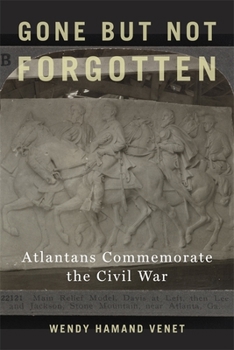Gone But Not Forgotten: Atlantans Commemorate the Civil War
This book examines the differing ways that Atlantans have remembered the Civil War since its end in 1865. During the Civil War, Atlanta became the second-most important city in the Confederacy after Richmond, Virginia. Since 1865, Atlanta's civic and business leaders promoted the city's image as a "phoenix city" rising from the ashes of General William T. Sherman's wartime destruction. According to this carefully constructed view, Atlanta honored its Confederate past while moving forward with financial growth and civic progress in the New South. But African Americans challenged this narrative with an alternate one focused on the legacy of slavery, the meaning of freedom, and the pervasive racism of the postwar city. During the civil rights movement in the 1960s, Atlanta's white and black Civil War narratives collided.
Wendy Hamand Venet examines the memorialization of the Civil War in Atlanta and who benefits from the specific narratives that have been constructed around it. She explores veterans' reunions, memoirs and novels, and the complex and ever-changing interpretation of commemorative monuments. Despite its economic success since 1865, Atlanta is a city where the meaning of the Civil War and its iconography continue to be debated and contested.Related Subjects
History




